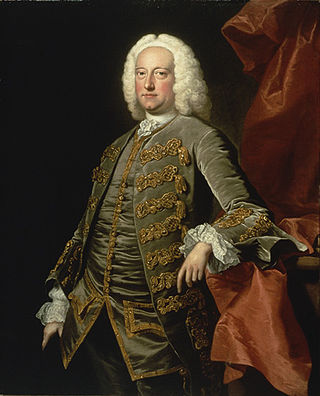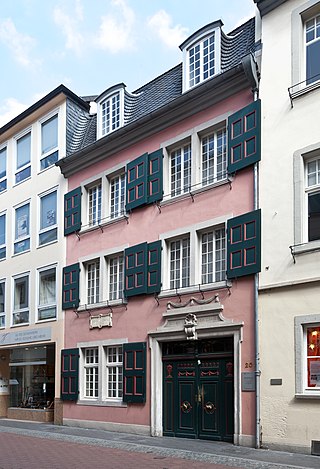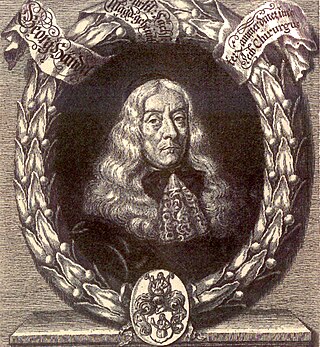
George FridericHandel was a German-British Baroque composer well known for his operas, oratorios, anthems, concerti grossi, and organ concertos. Handel received his training in Halle and worked as a composer in Hamburg and Italy before settling in London in 1712, where he spent the bulk of his career and became a naturalised British subject in 1727. He was strongly influenced both by the middle-German polyphonic choral tradition and by composers of the Italian Baroque. In turn, Handel's music forms one of the peaks of the "high baroque" style, bringing Italian opera to its highest development, creating the genres of English oratorio and organ concerto, and introducing a new style into English church music. He is consistently recognized as one of the greatest composers of his age.

Halle (Saale), or simply Halle (German: [ˈhalə]; from the 15th to the 17th century: Hall in Sachsen; until the beginning of the 20th century: Halle an der Saale[ˈhalə ʔan deːɐ̯ ˈzaːlə](listen); from 1965 to 1995: Halle/Saale) is the largest city of the German state of Saxony-Anhalt, the fifth most populous city in the area of former East Germany after (East) Berlin, Leipzig, Dresden and Chemnitz, as well as the 31st largest city of Germany, and with around 239,000 inhabitants, it is slightly more populous than the state capital of Magdeburg. Together with Leipzig, the largest city of Saxony, Halle forms the polycentric Leipzig-Halle conurbation. Between the two cities, in Schkeuditz, lies Leipzig/Halle International Airport. The Leipzig-Halle conurbation is at the heart of the larger Central German Metropolitan Region.

The Foundling Museum in Brunswick Square, London tells the story of the Foundling Hospital, Britain's first home for children at risk of abandonment. The museum houses the nationally important Foundling Hospital Collection as well as the Gerald Coke Handel Collection, an internationally important collection of material relating to Handel and his contemporaries. After a major building refurbishment the museum was reopened to the public in June 2004.

Agrippina is an opera seria in three acts by George Frideric Handel with a libretto by Cardinal Vincenzo Grimani. Composed for the 1709–10 Venice Carnevale season, the opera tells the story of Agrippina, the mother of Nero, as she plots the downfall of the Roman Emperor Claudius and the installation of her son as emperor. Grimani's libretto, considered one of the best that Handel set, is an "anti-heroic satirical comedy", full of topical political allusions. Some analysts believe that it reflects Grimani's political and diplomatic rivalry with Pope Clement XI.

Handel & Hendrix in London is a museum in Mayfair, London, dedicated to the lives and works of the German-born British baroque composer George Frideric Handel and the American rock singer-guitarist Jimi Hendrix, who lived at 25 and 23 Brook Street respectively.

Charles Jennens was an English landowner and patron of the arts. As a friend of Handel, he helped author the libretti of several of his oratorios, most notably Messiah.
George Frideric Handel (1685–1759) was a German/British Baroque composer.

The Beethoven House in Bonn, Germany, is a memorial site, museum and cultural institution serving various purposes. Founded in 1889 by the Beethoven-Haus association, it studies the life and work of composer Ludwig van Beethoven.

Baroque music of the British Isles bridged the gap between the early music of the Medieval and Renaissance periods and the development of fully fledged and formalised orchestral classical music in the second half of the eighteenth century. It was characterised by more elaborate musical ornamentation, changes in musical notation, new instrumental playing techniques and the rise of new genres such as opera. Although the term Baroque is conventionally used for European music from about 1600, its full effects were not felt in Britain until after 1660, delayed by native trends and developments in music, religious and cultural differences from many European countries and the disruption to court music caused by the Wars of the Three Kingdoms and Interregnum. Under the restored Stuart monarchy the court became once again a centre of musical patronage, but royal interest in music tended to be less significant as the seventeenth century progressed, to be revived again under the House of Hanover. The Baroque era in British music can be seen as one of an interaction of national and international trends, sometimes absorbing continental fashions and practices and sometimes attempting, as in the creation of ballad opera, to produce an indigenous tradition. However, arguably the most significant British composer of the era, George Frideric Handel, was a naturalised German, who helped integrate British and continental music and define the future of music in the United Kingdom.

George Frideric Handel was the house composer at Cannons from August 1717 until February 1719. The Chandos Anthems and other important works by Handel were conceived, written or first performed at Cannons.

Georg Händel was a barber-surgeon and the father of Georg Frideric Handel.
The Handel Reference Database (HRD) is the largest documentary collection on George Frideric Handel (1685–1759) and his times. It was launched in January 2008 on the server of the Center for Computer Assisted Research in the Humanities (CCARH) at Stanford University. Originally assembled by Ilias Chrissochoidis to support his PhD dissertation "Early Reception of Handel's Oratorios, 1732–1784: Narrative-Studies-Documents", it now includes about 4,000 items and 800,000 words. HRD is organized chronologically, covering the period from 1685 to 1784 and focusing on Handel's British career and reception. It includes transcriptions of printed and manuscript sources, some of which remain unpublished and external links to early secondary literature on the composer. The project received financial support from Houghton Library, Harvard University (2010–11) and UCLA's William Andrews Clark Memorial Library (2011–12).
The Handel Festival in Halle an der Saale, Saxony-Anhalt, is an international music festival concentrating on the music of George Frideric Handel in the composer's birthplace. It was founded in 1922 and it grew into a center of Handel studies and performance in Europe. Especially Handel's operas have been staged regularly, some of them as first revivals.

In 1703, the 18-year-old composer George Frideric Handel took up residence in Hamburg, Germany, where he remained until 1706. During this period he composed four operas, only the first of which, Almira, has survived more or less intact. Of the other three, the music for Nero is lost, while only short orchestral excerpts from Florindo and Daphne survive.
The London Handel Festival is an annual music festival centred on the compositions of George Frideric Handel which was founded in 1978. The festival also features other composers, but its main purpose is to showcase a range of Handel's work. It includes a Handel Singing Competition, which gives the finalists opportunities to develop their careers.
Wolfgang Hirschmann is a German musicologist.
Hans Albert Oskar Stieber was a German conductor, composer and violinist. He was the founding director of the Hochschule für Theater und Musik in Halle an der Saale.

The Wilhelm Friedemann Bach House is a cultural site in Halle in Saxony-Anhalt, Germany. The composer Wilhelm Friedemann Bach (1710–1784), eldest son of Johann Sebastian Bach, lived here during part of his career; the building now has an exhibition about W. F. Bach and other composers who lived in Halle.
The Händel-Jahrbuch (HJb) is a music scientific journal dedicated to the composer George Frideric Handel. It is published annually by the international Handel-Gesellschaft in conjunction with the foundation Handel House in Halle. The "scientific secretary" of the Handel Society is also chief editor of the Jahrbuch, and since 2011 the musicologist Annette Landgraf.














